Artwork Needed for DSCC Greeting Card Contest

Original drawings will be featured in DSCC’s new collection of greeting cards.
Calling Illinois artists of all ages!
The University of Illinois at Chicago’s Division of Specialized Care for Children (DSCC) is seeking artwork for our collection of greeting cards. The cards will be sent to our participants, providers and community partners.
Who is eligible?
The contest is open to Illinois residents of all ages. Artists can choose any or all of the six greeting card templates and illustrate what each theme means to them. Creativity is encouraged!
Each template is two pages and includes a release for parents and/or youth ages 18 and older to sign. A signed release must be submitted with the artwork in order to be entered into the contest.
You may click on each template link below to print them out and personalize:
You may also call DSCC at (800) 322-3722 to have templates sent to your home.
How to submit:
Artwork and a signed release should be submitted to DSCC by Sept. 15, 2019.
Mail to:
UIC Division of Specialized Care for Children
3135 Old Jacksonville Road
Springfield, IL 62704
Attention: Amanda Simhauser
OR
If you are a DSCC participant, you can give contest submissions to your Care Coordinator.
Selection process:
Each submitted drawing will be posted on DSCC’s Facebook page .
Drawings that receive the most “likes” by Oct. 15, 2019, will be considered for the greeting cards. Be sure to visit our page, vote and share!
The greeting cards will be given away for promotional purposes and will not be sold. Winners will have a set of greeting cards mailed to the address provided.
Institute Provides Support, Connection for DSCC Families of Children With Hearing Loss
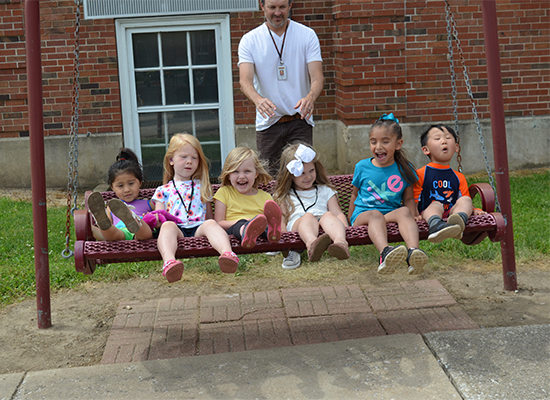
Families gain knowledge, resources and friendships during the 2019 Institute for Parents of Preschool Children who are Deaf or Hard of Hearing.
When Leticia Hubart learned about the Institute for Parents of Preschool Children Who Are Deaf or Hard of Hearing, she knew she must attend.
Her 4-year-old son, Liam, was just diagnosed with hearing loss in December after showing behavioral issues.
“Hearing loss was not on my radar. I dove right into educating myself,” she said.
Leticia, Liam and his big sister, Teagen, traveled from Rock Island to the Illinois School for the Deaf campus in Jacksonville to attend the Institute. They joined 33 other families from across the state for the weeklong program from June 9-14.
“It’s changed my world,” Leticia said of the experience. “It opened my eyes to the diversity of hearing loss. It’s not a doom-and-gloom kind of diagnosis. He’s going to be OK, and I’m going to be the best advocate I can be for him.”
The Institute provides support and valuable information on communication options, language development, amplification, social-emotional development and school programs. There is no cost to participating families.
A common link
UIC’s Division of Specialized Care for Children (DSCC) supports the Institute, along with other sponsors.
This year’s Institute was the largest on record, with 34 participant children enrolled and a total of 119 people attending from 31 families.
Participating parents attend daily lectures by experts in the field to learn about raising a child with hearing loss. Lecture topics include:
- Child development
- Types of hearing loss
- Language development
- Communication choices
- Assistive communication devices
- Deaf culture
- School programming
Other activities include meeting in small groups to discuss specific concerns and connecting with other caregivers. Parents are also able to have a night out together without their children.
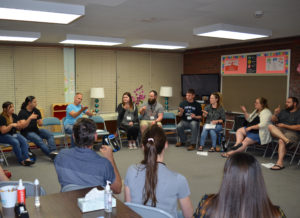
An American Sign Language instructor teaches parents during the 2019 Institute for Parents of Preschool Children Who Are Deaf or Hard of Hearing.
During the Institute, children attend classrooms based on their age group. Experienced teachers of children who are deaf or hard of hearing oversee these classrooms.
Attending children have the opportunity to receive hearing, vision, psychological, speech, language and educational evaluations as well as play with other children who have a hearing loss.
Their siblings are also welcome to attend and participate in fun and educational activities, including art projects and learning to sign. This year’s sibling program had 30 children.
There is no cost for families to participate, and meals and housing are provided at no charge.
“I am very delighted that one common link that each of these families share is that each one of them is a DSCC family. I am so thankful to our DSCC staff for the extra work that was involved in getting each of these families ready for this weeklong experience,” DSCC Family Liaison Violet Wiker said.
A community ready to help
T.J. and Brianna Taylor of Macomb attended the Institute with their 11-month-old daughter, Larkin.
Larkin’s newborn hearing screenings were positive, suggesting she may have a problem hearing. She then underwent an Auditory Brainstem Response (ABR) test. She was diagnosed with bilateral sensorineural hearing loss and enrolled with DSCC and Early Intervention.
“She’s been in her element. She loves watching people sign,” T.J. said, noting Larkin has already mastered several basic signs herself.
The Taylors want to let Larkin choose her communication form and her assistive device as she gets older. T.J. said it’s been valuable for the couple to hear so many positive stories about different options.
Brianna said she also values the connection with other families.
“We all have different journeys but it’s nice to be able to relate to those different stories,” she said.
Lynsey Runyon attended with her 4-year-old son, Branson. She said she was impressed with the amount of information available during Institute.
Years of problems passed before Branson’s hearing loss was diagnosed in spring 2018. A few months later, Lynsey moved her family to Jacksonville so Branson could attend the Illinois School for the Deaf late last fall.
Lynsey said she often feels she is trying to play catch-up with learning about the world of hearing loss. She appreciated the Institute’s more in-depth lectures and workshops to explain topics in ways she could easily understand.
“I only wish we would have found out about this sooner,” she said.
Many of the attendees encouraged other parents to consider the Institute.
“Don’t be afraid to ask for help because you have a community that’s ready to be there and help you,” Leticia Hubart said. “Don’t’ be afraid to advocate for your child.”
Visit our Facebook page for photos from this year’s Institute.
For more information about the Institute for Parents of Preschool Children Who Are Deaf or Hard of Hearing and how DSCC supports children with hearing loss, call (800) 322-3722 or email dscc@uic.edu.
Visit our Facebook page for photos from this year’s Institute.
The following organizations supported the 2019 Institute:
- University of Illinois at Chicago’s Division of Specialized Care for Children (DSCC)
- Department of Human Services (DHS) Division of Rehabilitation Services (DRS)
- Illinois School for the Deaf (ISD)
- Illinois State Board of Education (ISBE)
- Department of Public Health (DPH)
- Ann & Robert H. Lurie Children’s Hospital of Chicago
DSCC “Angel” Helps Teen’s Wish Come True
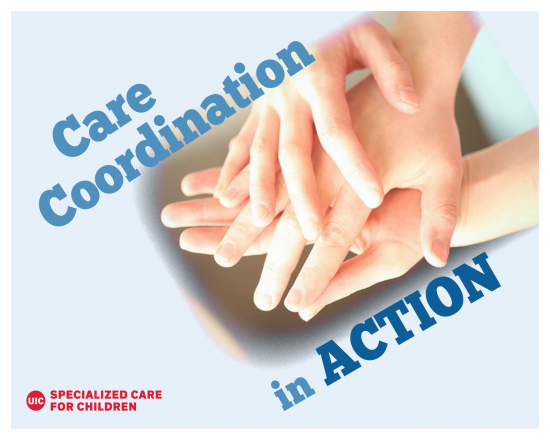
Division of Specialized Care for Children participant Trenten Jankuski has a special vacation and accessible home, thanks to Care Coordinator Angel Lawrence’s efforts.
Angel Lawrence is a Care Coordinator at the University of Illinois at Chicago’s Division of Specialized Care for Children (DSCC). A big part of this job involves connecting families with the right services and resources to support their children with special healthcare needs. Sometimes, a seemingly simple connection can make a dream come true.
Such was the case for Trenten Jankuski, a 16-year-old DSCC participant with cerebral palsy.
More than two years ago, Angel started working closely with Trenten’s family to help make their home more accessible.
The Jankuskis live in a bi-level home. It made sense for Trenten’s therapy needs to move his living space to the home’s lower level. However, Trenten’s power wheelchair could not access the lower level.
Angel got to work seeking bids from vendors who could examine the house and determine what modifications would be necessary. Angel enlisted the help of UIC’s Assistive Technology Unit, which determined that an elevator would be the best option for the home and Trenten’s wheelchair. The elevator, however, would have a high price tag.
Angel then started checking for funding sources and grant opportunities. After months of effort, she helped the Jankuskis receive a grant from the Illinois Department of Rehabilitation Services to cover most of the elevator’s costs. Angel also contacted Make-A-Wish Illinois and the Illinois Elks Children’s Care Corporation to see if any assistance was available.
The Illinois Elks Children’s Care Corporation was able to provide the remaining funds needed for the elevator, which was installed in March.
But the Make-A-Wish Foundation took an interest in Trenten’s story and contacted his mother to set up an interview in February. A trip to Disney World for his whole family was soon in the works for the avid Disney fan.
On March 15, local Make-A-Wish granters met Trenten’s parents at his high school to surprise him and announce the special vacation would start that Sunday. The Kankakee Daily Journal newspaper was there to capture the fun announcement. You can read the Daily Journal’s coverage on the newspaper’s website.
Angel said she’s delighted to see Trenten, his parents and his siblings have this special getaway together.
“This is an opportunity for them as a family to really enjoy one another in a fun atmosphere, away from the reality of day-to-day life,” she said. “They can enjoy a real vacation.”
We’re grateful for Angel’s hard work to help this very deserving family. Congratulation to Trenten and all of the Jankuskis!
DSCC Associate Director Earns Nursing Honor
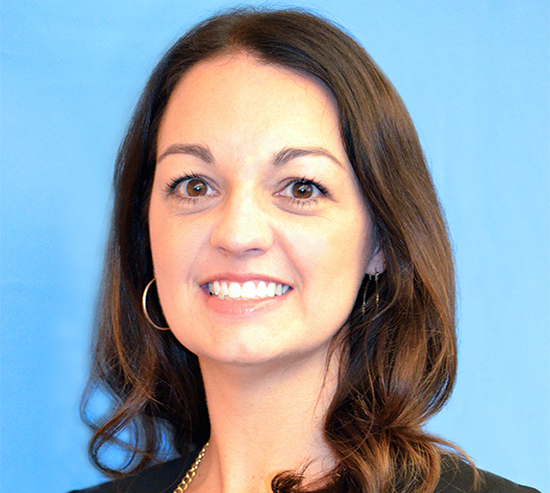
Molly Hofmann has been named an Emerging Nurse Leader in Illinois.
The University of Illinois at Chicago’s Division of Specialized Care for Children (DSCC) is pleased to announce that our Associate Director Molly Hofmann is one of the 40 Under 40 Emerging Nurse Leaders in Illinois.
The Illinois Nurses Foundation sponsors this award, which highlights and celebrates young nurse leaders who are influencing health care and the nursing profession today.
Molly is an advanced practice registered nurse (APRN) who serves as DSCC’s Associate Director of Care Coordination. In this role, she oversees the development and implementation of all care coordination operations, policies and procedures for the Core and Home Care Programs.
Molly is also working on her doctorate of nursing practice degree through UIC’s College of Nursing in Peoria.
“This is a wonderful recognition of what she has accomplished in her young career. We are fortunate to have Molly as part of the DSCC Leadership Team,” DSCC Executive Director Thomas Jerkovitz said. “She lives our mission to partner, help and connect every day.”
Molly says she is passionate about the appropriate and comprehensive care of the pediatric patient and their family.
“I have seen the positive impact good care coordination can have for children and their families and am excited to be a part of a team with a mission to partner, help and connect families and the community,” she said.
Before joining DSCC in November 2016, Molly worked as an APRN at the Pediatric Resource Center in Peoria. The Pediatric Resource Center is a program of the UIC College of Medicine in Peoria and affiliated with Children’s Hospital of Illinois (CHOI).
Her past experience also includes:
- Serving as an APN and clinic coordinator of the Trach/Vent Program at CHOI
- Performing clinical projects as a Six Sigma Black Belt
- Working as a registered nurse in pediatric intermediate care and the emergency department
Molly lives in Washington with her husband and two young daughters.
Molly and her fellow awardees will be honored on Sept. 12 at the Illinois Nurse Foundation’s award recognition event in Lisle.
Congratulations, Molly, on this well-deserved honor!
DSCC Promotes Better Communication Across the Lifespan
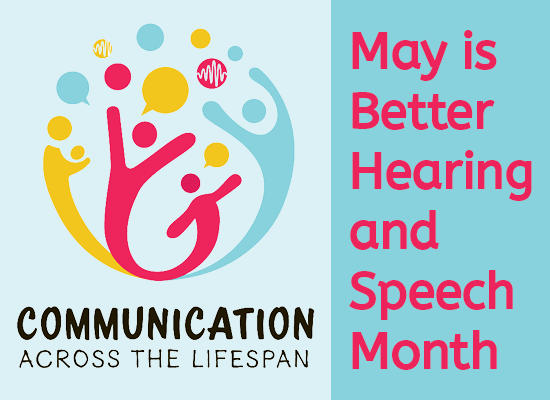
UIC’s Division of Specialized Care for Children highlights the need for timely screenings and follow-up services in honor of Better Hearing and Speech Month.
The ability to communicate is one of the most important achievements of early childhood.
If a child’s ability to hear or speak is limited or absent, different supports are necessary to reach this milestone.
In honor of Better Hearing and Speech Month in May, the University of Illinois at Chicago’s Division of Specialized Care for Children (DSCC) reminds parents and caregivers of the importance of early screenings and follow-up services for children and youth with hearing and speech impairments.
“If left undetected, hearing and speech impairments can affect a child’s behavior, social interactions, academic success and more,” DSCC Executive Director Thomas Jerkovitz said.
“Early detection is crucial as many services and resources are available to help these children develop age-appropriate language skills. The sooner a child receives a diagnosis, the sooner he or she can receive the proper support to reach their full potential.”
DSCC is a state program that serves Illinois children with special healthcare needs, including hearing and neurologically-related speech impairments.
Our organization has 11 regional offices throughout Illinois. DSCC staff includes speech and language pathologists, audiologists, social workers, nurses and other professionals trained to help families find the specialty care and resources their child needs.
DSCC care coordination teams are a great resource for both families and healthcare professionals when a child does not pass a hearing screen and needs a diagnostic evaluation. They can also assist when there are concerns about a child’s communication skills.
Our Care Coordinators can educate families about their child’s condition, find specialized medical care for their unique needs and explain available options for communication and language development.
They can also attend school meetings with parents to ensure their child’s educational needs are being met and connect families with support services and community funding opportunities, if needed.
DSCC also plays an important role in the Illinois Early Hearing Detection and Intervention (EHDI) program. The EHDI program works with hospitals, pediatric healthcare providers, audiologists and parents to ensure:
- All infants are screened for hearing loss no later than 1 month of age.
- All infants who do not pass their hearing screen receive a diagnostic evaluation no later than 3 months of age.
- All infants with a hearing loss enroll in early intervention services no later than 6 months of age.
Research shows that infants with hearing loss can develop similar language skills to their peers without hearing loss by the time they enter kindergarten when these “1-3-6” benchmarks are met.
DSCC recommends that parents and caregivers talk to their child’s healthcare provider if they have questions or concerns about their child’s hearing, speech or language. The American Speech-Language-Hearing Association provides helpful resources about warning signs at https://identifythesigns.org/.
If a child does not pass a hearing screen and is in need of a diagnostic evaluation or support for a medical condition, parents and caregivers can contact us at (800) 322-3722 or dscc@uic.edu.
Special Needs Summer Camps 2019

Day and overnight summer camp opportunities for all ages and abilities throughout Illinois.
Summer is fast-approaching, along with a long break from school. We’re here to help you find the right activities and programs to keep children and young adults engaged and learning.
Our Care Coordinators and support staff have compiled a list of day and overnight summer camp opportunities across the state. These camps are designed for a variety of special needs and abilities, including many of our program’s eligible medical conditions.
Whether your child wants to make new friends, develop new skills, meet others with their condition or foster their independence, our 2019 summer camp list provides a variety of options.
Our events calendar shows the summer camps listed by date. You may also search for events in your area by clicking on a regional office near you.
DSCC Toddler’s Special Heart Surgery Gains National Attention
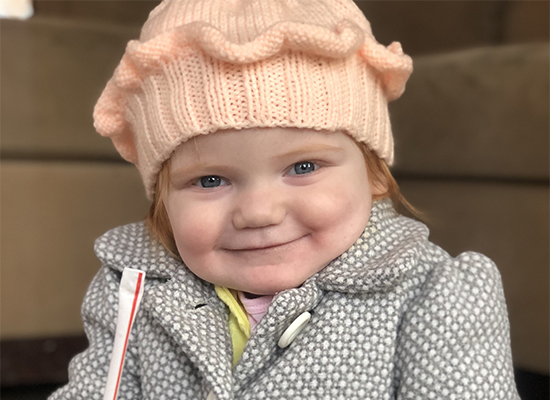
Doctors placed a “winter coat” around Eloise Hoffman’s heart to fix a rare congenital heart defect.
Eloise Hoffman is an energetic 2-year-old who loves to laugh, play outside and chase her grandparents’ dog.
“She’s just this little fireball that people can’t help but love,” her mom, Krista Hoffman, said
Thanks to what her family calls a “winter coat” for her heart, Eloise is now thriving after a major surgery to fix her rare critical heart defect.
Her amazing story has gained national news coverage and captured the hearts of thousands across the country.
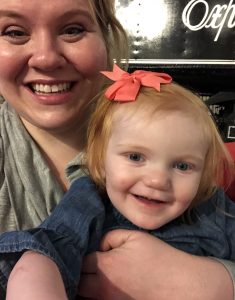
Eloise and her mother, Krista Hoffman.
“People have been so supportive,” Krista said. “We are so grateful that everyone cares so much for her and for us.”
Shortly after she was born, Eloise’s pediatrician noticed she had a heart murmur and referred her to Dr. Michael Perez, a pediatric cardiologist at Northwestern Medicine Central DuPage Hospital.
Dr. Perez diagnosed Eloise with truncus arteriosus, a birth defect of the heart in which only one common blood vessel comes out of the heart instead of two. The single vessel means oxygen-poor blood and oxygen-rich blood get mixed together, sending too much blood to the lungs and causing the heart to work harder.
“It sort of felt like it was out of a movie, because he told us and then a few minutes later we were ushered into another room because we would have to go up to Lurie Children’s Hospital via either a helicopter or ambulance,” Eloise’s father, Matt Hoffman, told People Magazine, who covered Eloise’s story. “It all just took off from there within five minutes of learning what was happening.”
Eloise required immediate surgery or she would go into heart failure. When she was only three weeks old, doctors placed a piece of Gore-Tex insider her heart.
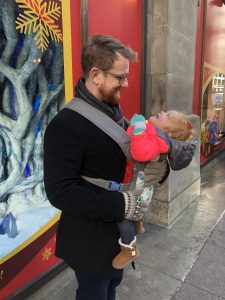
Eloise and her father, Matt Hoffman.
Gore-Tex is a material that’s often used to make jackets and outerwear. For Eloise, it serves as conduit to make up for the single blood vessel out of her heart.
“I like to tell people that she’s got a little winter coat in there, keeping her heart warm,” Matt told Good Morning America.
To Matt and Krista’s relief, the surgery was a success. Eloise soon came home to her parents and older brothers.
In 2018, Eloise became enrolled with the University of Illinois at Chicago’s Division of Specialized Care for Children (DSCC). Her older brother Henry, who has a g-tube and dysphasia, is also a DSCC participant.
“Since we have the two children that have special needs, it can be difficult sometimes,” Krista said. “We just really appreciate that there is a service out there like this for families like us to take some of the burden away. It allows us a little less stress and a little more time to just be parents.”
Today, Eloise is doing great and continues to grow and gain weight normally.
“She eats like a champ. We actually call her the little garbage disposal at our house because she loves everything,” Krista said.
Dr. Perez recently told the Hoffmans that Eloise is near the point where she’ll only need annual appointments.
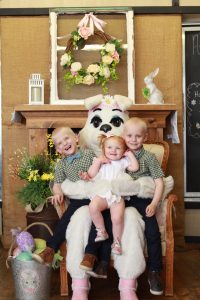
Eloise and her two older brothers during a recent visit to the Easter Bunny.
“That’s huge,” Krista said. “She will probably need a (catheterization) procedure in a year or so because she has stenosis where the conduit was stitched in, and she as a mild to moderate leak in her valve. Those are all future issues, though.”
Krista said her family appreciates the interest in Eloise’s condition. She believes it is important to spread awareness and talk more about congenital heart defects.
“For any parents who are pregnant or have truncus babies, it seems scary, but it’s not as frightening as you think it will be,” Krista told People Magazine. “Focus on the things you can change, not the things that you can’t.”
Habitat for Humanity Provides Accessible Home for DSCC Family
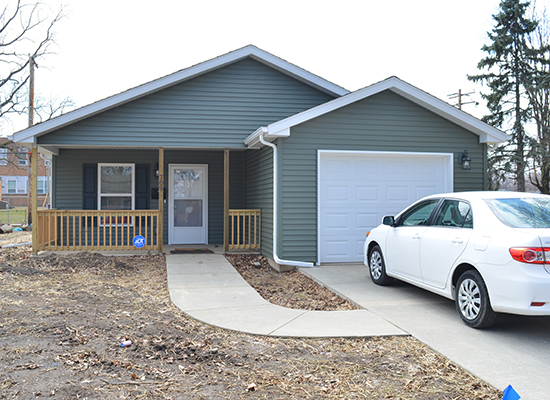
Community support helped the Barmaki family achieve homeownership.
Raising five children in a small two-story apartment is difficult. It’s especially challenging when one of them uses a wheelchair.
Jaouad and Hoda Barmaki had to carry their daughter Bayan up and down the steps to access the bathroom and her bedroom. Bayan, 11, is unable to walk due to scoliosis, cerebral palsy and other health conditions.
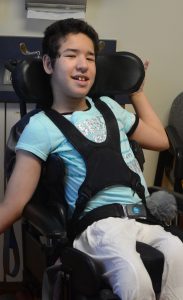
Bayan Barmaki, 11.
This challenge was daily life until the Barmakis applied for Habitat for Humanity of Champaign County’s homeownership program.
With Habitat’s help and community support, the Barmakis now have a brand-new one-story home that’s fully accessible for Bayan’s needs.
“It’s so much easier,” Jaouad said. “No more going up and down the stairs. If I’m not here, my wife can easily get (Bayan) where she needs to be.”
Jaouad and Hoda moved from Morocco to Champaign, where they got married and started a family. Bayan is their oldest child.
Bayan became enrolled with the University of Illinois at Chicago’s Division of Specialized Care for Children (DSCC) shortly after birth.
Jaouad said DSCC’s support has been extremely helpful for his family, especially when he faced language barriers when communicating with certain providers.
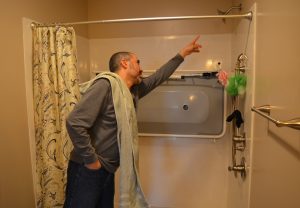
Jaouad Barmaki explains how the shower lift works in his family’s new, accessible bathroom.
After Habitat accepted the Barmakis’ application, the family’s DSCC Care Coordinator Dan Beagles and Bayan’s school physical therapist helped provide input on the building plans.
“We met at the Habitat office here in town, and the builder had the blueprint of what he was picturing,” Dan said. “We went over what would benefit Bayan the most with accessibility and safety.”
The Barmakis’ new home has zero-step entrances and a more spacious floor plan to make it easier for Bayan’s wheelchair to navigate. Her bedroom has a widened doorway, and the bathroom features a roll-in shower with a lift.
The new home is also located near the Barmaki children’s schools and has plenty of yard space for the kids to play outside.
As part of the homeownership program, the Barmakis put in 250 hours of “sweat equity” that included home maintenance classes, hours working in the
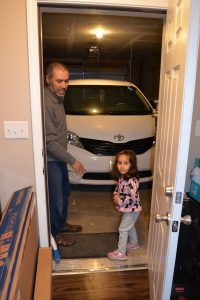
Jaouad Barmaki points out the zero-step entrance from the garage into his family’s new home.
Habitat ReStore and working on the build site.
They moved into the house on March 7. Local news outlets, including WCIA 3 News and Smile Politely magazine, covered the house’s dedication.
Jaouad recently took Dan on a house tour during one of Dan’s regular home visits with the family.
He said everyone involved in the building process was very helpful and his family is deeply grateful.
Dan enjoyed seeing the finished house and how it’s improved their quality of life.
“It couldn’t have happened to a nicer family,” Dan said. “They are such a joy to work with.”
Congratulations to the Barmakis!
DSCC Mom Raising Funds and Awareness for Epilepsy

Trisha Jamison’s son Everett has Dravet syndrome, a rare form of epilepsy.
Life with epilepsy can be a hard battle and an emotional roller coaster.
“To watch your small child have a seizure for an hour and be so helpless is the absolute worst feeling in the world,” Trisha Jamison said.
Trisha’s 3-year-old son Everett has Dravet syndrome (DS), a rare form of epilepsy that causes developmental and cognitive delays. He’s been enrolled with the University of Illinois at Chicago’s Division of Specialized Care for Children (DSCC) for the last two years.
After his diagnosis, Trisha immersed herself in research and connected with other parents and individuals who have been affected by epilepsy and DS.
Her connections led her to start a successful 5k walk last October that raised more than $11,000 for the LaSalle County Epilepsy Foundation, Dravet Syndrome Foundation research and local families affected by epilepsy. Trisha says the plan is to make the walk an annual event.
“My personal driving force is after attending some Dravet syndrome conferences and talking to many in an online DS caregiver support group, there are a lot of clinical trials and research being done for better medicines and a potential cure,” Trisha said. “In reality, these trials and research need money to continue, so the thought of them potentially finding a cure for my baby made me jump at the chance to fundraise for these trials. I thought it’s the least I could do.”
The idea for the “Seize Hope” fundraiser and awareness walk on Oct. 13 came from her friendship with Erika Fleck of the LaSalle County Epilepsy Foundation of North Central Illinois.
Trisha and Erika met through a mutual friend. Erika, who was diagnosed with epilepsy in adulthood, became a great resource for Trisha. The pair have attended several DS and epilepsy conferences together and decided to try fundraising for both foundations.
“The idea for the 5k walk came to us because there’s nothing like that in our area for Epilepsy or Dravet syndrome awareness, yet there are a lot of individuals in our area that have been affected by seizures in some form or another,” Trisha said.
“We decided to do this, not just for the financial aspects but to raise awareness and let people know that they’re not alone and there are resources out there for them.”
Trisha said she initially hoped for 50 runners and to raise several hundred dollars. But the community support exceeded her expectations with more than 100 registered walkers and $11,000-plus raised. The Times newspaper in Ottowa and the LaSalle NewsTribune each covered the event.
While most of the funds were donated to support research, Trisha said a small portion of the proceeds were kept to support local epilepsy families with resources and related expenses.
“I want parents and caregivers to know there are support groups and so many resources available in this day and age. I couldn’t do daily life without those other parents. They are encouraging and so full of knowledge,” Trisha said.
Everett has daily atonic or drop seizures, which cause a partial or complete loss of muscle tone, and is cognitively closer to a 1-year-old. Doctors initially told the Jamisons that Everett wouldn’t walk but with frequent physical therapy, he took steps last fall.
“He is on four meds and has a VNS (vagus nerve stimulation) device. But you know what, that isn’t who he is. He is so funny. He is, most of the time, so happy, and he gives the best hugs in the world,” Trisha said.
She urges other DS and epilepsy families to be an advocate and voice for their child.
“Buckle up, hold on tight and don’t give up hope,” Trisha said.
DSCC Teamwork Helps Infant Heart Patient

DSCC staff provide an air conditioner to family of baby boy recovering from heart surgery in triple-digit temperatures.
Families enrolled with the University of Illinois at Chicago’s Division of Specialized Care for Children (DSCC) know their care coordination team is here to help. This help can include finding resources and developing a care plan to meet their unique needs and goals.
What our families may not realize, however, is how many DSCC staff work together behind the scenes to help our Care Coordinators find the best solutions for their child.
A powerful example of this group effort occurred after a 4-month-old baby boy underwent open heart surgery during a stretch of dangerously hot temperatures.
The boy was born with a heart condition shortly after his family moved to Illinois. After spending several weeks in the neonatal intensive care unit, he was able to go home in June and prepare for surgery later in the fall. However, his family soon learned that the surgery couldn’t wait. He underwent the procedure in July.
“It was a blow to them,” their Care Coordinator Robin Mahnken said. “But, they did the surgery and he went through it with flying colors.”
Shortly after the surgery, DSCC Administrative Services Coordinator Debbie Cole called the baby’s mother to check in. The mother reported that her son’s recovery was going well until an intense heat wave hit the area. The family didn’t have an air conditioner, and she was concerned how the extreme temperatures would affect him.
“Instead of saying, ‘I’m sorry to hear that,’ Debbie went, ‘Hmm, I wonder if we can help,’” Robin recalled.
Debbie went to Robin and the two began brainstorming ways to get an air-conditioning unit for the family’s home. Robin soon learned that durable medical (DM) equipment providers would not be able to help. She then went to her supervisors, who suggested an alternate way for DSCC to support the cost for an air conditioner.
Robin then got to work trying to find a non-medical, general merchandise retailer who would be able to bill DSCC for the cost of the air conditioner.
Robin contacted a big box retailer in town, which was willing to help. But, there were several administrative hurdles to overcome. She enlisted the help of two store managers, their general manager and a clerk to develop a plan for the store to accept a prior approval from DSCC to provide the air conditioner.
Robin then worked with DSCC Claims Services staff and the Provider Data Unit to enroll the retail store as a provider and work out a solution for payment. Claims Services Supervisor Michele Dillon even called into the office while on vacation to work with DSCC’s Business Office and Provider Data Unit to make sure a solution was reached quickly so the retailer could be paid as soon as possible and the family could have the much-needed air conditioner.
Once a payment solution was reached, another DSCC Care Coordinator went with Robin to pick up the air-conditioner, deliver it to the family’s home and install it for them.
“That is how a family with a 4-month-old baby who just underwent open heart surgery was able to get an air conditioner on a day when the heat index was 113 degrees at 2 p.m.,” Robin said. “This whole organization and this whole other business pulled together to help this one little person.”
We are extremely proud of our compassionate employees and their willingness to go the extra mile to provide the best outcomes for our families.
DSCC Regional Manager Mary Gruenich put it best – “In my 25-plus years at DSCC, I have witnessed many outstanding examples of dedicated and caring staff going above and beyond to meet the needs of their families. However, I don’t recall such an exemplary example of true care coordination that involved so many units within DSCC to meet the needs of a 4-month-old cardiac patient… completed within 24 hours!”


